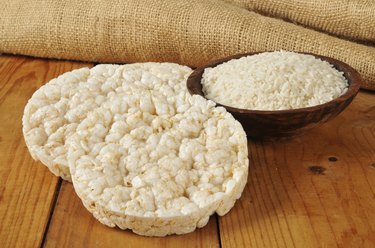
Rice cakes are usually made from brown rice, which is a health benefit because whole grains provide fiber, carbohydrates and phytochemicals. They make a good snack because they're fat-free and low in calories, but they're not rich sources of other nutrients. Some rice cakes contain additives or added flavorings and sugar, so check the food label on your rice cakes to be sure they're healthy for you.
Whole Grains
Video of the Day
Some whole grain products carry a "Whole Grains" stamp. Otherwise you can identify a whole-grain product by making sure that brown rice or whole-grain brown rice is listed as the first ingredient. Whole grains retain all of the grain's fiber and a large percentage of its minerals. These nutrients are lost in processed grains such as white rice. Most brands of rice cakes have 0.5 to 1 gram of fiber and 2 percent of the recommended daily value of iron, magnesium and zinc. Whole grains also provide complex carbs for energy and antioxidant phytochemicals that help keep your cells healthy, according to Kansas State University.
Video of the Day
Calories, Fat and Sugar
Rice cakes are usually fat free and low in sugar and calories, which makes them a good snack choice. The size of the cake differs between brands and some have added sugar or sweets such as chocolate. These differences impact the amount of calories and sugar. The calories range from about 35 to as high as 80 per cake. Sugar may range from none to 4 grams or more in one rice cake. Brown rice contains some natural sugar, but to see if your rice cake has added sugar, look for ingredients such as sugar, fructose, sucrose, honey and corn syrup.
Healthy Diet
A diet containing a variety of fresh vegetables, fruits, lean meats, low-fat dairy and whole grains is recommended by the American Dietetic Association for optimal health. Rice cakes can fit nicely into a healthy menu. As a snack, rice cakes go well with lean protein sources and spreads such as hummus or reduced fat peanut butter. The cakes also work well as a bread substitute and can be used to build a sandwich. Try layering turkey, sprouts and tomatoes or any of your favorite vegetables on your rice cake. If you buy rice cakes that contain flaxseeds you'll gain calcium, iron and healthy unsaturated fats.
Considerations
A potential downside to rice cakes is their sodium content. One cake may have as few as 20 milligrams of sodium or as much as 75 milligrams. With a recommended daily intake of 1,500 milligrams, that means one cake can have as much 5 percent of an entire day's sodium. That might sound reasonable, but every little bit counts. Most Americans consume more than the recommended daily intake, which causes high blood pressure and increases your risk of cardiovascular disease. Like other foods, as long as you eat rice cakes in moderation, they're a healthy addition to your diet. On the flip side, the calories and sodium quickly accumulate if you eat too many.
- Kansas State University: Healthful Whole Grains
- Linus Pauling Institute: Sodium (Chloride)
- American Dietetic Association: Back to Basics for Healthy Weight Loss
- American Journal of Clinical Nutrition: Sodium and Potassium Intakes Among US Adults: NHANES 2003-2008
- USDA Nutrient Data Laboratory: Snacks, Rice Cakes, Brown Rice, Plain
- Whole Grains Council
- Eatright.org